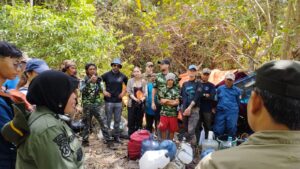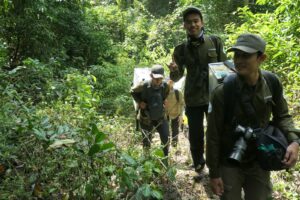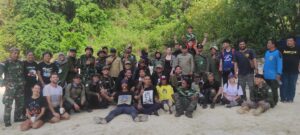 The release of wild species, namely long-tailed monkeys (Macaca fascicularis) and pythons (Python sp.), at the Nusa Barong Jember Animal Sanctuary was organized by the Indonesian Animal Network (JSI) in collaboration with the Java Natural Resources Conservation Agency (BKSDA). East (15/7). “This agenda involves several parties, such as local fishermen, the Indonesian Navy, and academics, namely lecturers and students of the Biology Department, FMIPA UNEJ,” said Hari Sulistiyowati, Ph.D. Biology lecturers who are active in the agenda.
The release of wild species, namely long-tailed monkeys (Macaca fascicularis) and pythons (Python sp.), at the Nusa Barong Jember Animal Sanctuary was organized by the Indonesian Animal Network (JSI) in collaboration with the Java Natural Resources Conservation Agency (BKSDA). East (15/7). “This agenda involves several parties, such as local fishermen, the Indonesian Navy, and academics, namely lecturers and students of the Biology Department, FMIPA UNEJ,” said Hari Sulistiyowati, Ph.D. Biology lecturers who are active in the agenda.
Hari also said that three lecturers from the K-Biotrop Research Group, along with 2 students from the Masters Program in Biology and 2 students from the Biology Undergraduate Program, Faculty of Mathematics and Natural Sciences, University of Jember, were involved for the first time in this release activity as a form of collaboration with BKSDA Region III Jember. “This activity provides insight and experience, as well as raising biology students’ concern for animal preservation,” she continued..
A total of 40 long-tailed monkeys (two groups) and four pythons that were caught in the illegal trade and have been rescued and rehabilitated were successfully released to the Nusa Barong Wildlife Sanctuary area of Jember. This program is the 4th on the agenda for JSI and BKSDA in Nusa Barong and the first for academics from the Biology Department, FMIPA UNEJ.
Arif Mohammad Siddiq, one of the Wildlife Lecturers from UNEJ, stated that the long-tailed monkey species is a member of the primates that has a very serious level of threat. “In 2022, the long-tailed monkey species will be included in the category of endangered species or endangered species based on the IUCN Red List,” he explained.
One of the contributing factors is overexploitation as pets or more extreme use as a “topeng monyet“. So this activity initiated by JSI is an important conservation effort for several rare and threatened wildlife species. It is hoped that in the future, the Department of Biology, FMIPA, will continue to contribute to this activity and be able to follow up on conducting research related to post-release monitoring at the Nusa Barong Wildlife Sanctuary.


